When researching pet food labels and ingredients such as “yucca extract”, this can get confusing causing one to question on whether or not really is truly needed or safe. This article brings out importance of additives in pet nutrition while busting common myths. As pets transitioned from being outdoor sidekicks to being adored family members, the dietary needs presented a drastic change as well, hence advancing pet food especially the dry feeds known for their convenience and wholeness. These products are tailored to meet the various life stages and health needs of pets, thus guaranteeing the well-being of pets without having to perform other custom food preparations. Understand the nuances of pet nutrition, such as differences or variations in dietary needs between dogs and cats by referring to our feeding tips.
Understanding Additives in Pet Food
Contrary to popular misconceptions, the pet food additives are functional inputs and indispensible for your healthy pets. More than mere fillers, these include selective additives, microbial or product components added when the manufacturing takes place. The primary objective of these additives is enhancing nutritional value, assuring quality and meeting the vast health requirements adjusted for different pets.
The Misconceptions and the Truth
Several reasons contribute to the skepticism surrounding food additives in pet diets:
- Safety Concerns: Common concerns over the long term health effects of some additives. While most of the additives have gone through such a stringent testing and tested as safe, there has been a few linked to being allergenic hence causing adverse effects on an individual health and also to change in behavioral.
- Lack of Understanding: Majority of persons do not get to understand the role played by these additives and therefore misconstrue that all are artificial and detrimental.
- Complex Labels: The inclusion of the scientific names into the labels could confuse pet owners in failing to understand exactly want goes on in making the additives for their food.
- Distrust of Food Manufacturers: Some consumers still are not totally trusting of pet food manufacturers, suspecting that cost or length of product shelf life is more the motivation for using additives than magnifying food quality or safe.
It is, however, important to mention that most of the additives are there to ensure good quality and safety in pet food, and most go through very stringent assessments and regulations. Our detailed guide on mix-feeding has some useful info on added components playing a role in the diet of our pets.
Knowing the importance of these additives and their safety can help the pet owners to make an informed decision regarding the dietary plan for pets. The diet which should be planned must have a reasonable and well-balanced nutritional plan in order to make the right decision regarding what additive they need.
Key Additives and Their Benefits
There are therefore various factors that require certain additives in the dogs and cat for purposes of improving health as well as wellbeing at large. These additives include probiotics as well as quite significant antioxidants to various aspects of pet health.
Probiotics
Probiotics are one or more species of preparations comprising of live organisms, important in pet nutrition as the preparation, when ingested in sufficient numbers, is able to confer health benefits. Beneficial bacteria, most of which fall under the genera Lactobacillus and Bifidobacterium, together with yeasts such as Saccharomyces boulardii are very critical in gut homeostasis. These organisms help maintain a healthy balance of flora in the intestines, promote digestion as well as absorption of essential dietary components, blow up the immune response, and suppress inflammation. Probiotics have been found quite effective in the prevention as well as control of diseases such as infectious diarrhea, food allergies, irritable bowel syndrome, atopic dermatitis, and urinary tract infections. Nonetheless, they are not wonder drugs, hence prior consultation with a veterinary specialist before administration of any supplements is essential.
Prebiotics
Prebiotics are compounds selectively nourishing useful gut bacteria poorly being hydrolyzed. They can either be naturally in existence within the ingredients of an animal diet or deliberately included as concentrated exogenous sources artificially. Common prebiotics available in pet nutrition include Fructooligosaccharides (FOS), Mannan-oligosaccharides (MOS) and Galactooligosaccharides (GOS). These compounds play some essential roles in health such as prevention of dental caries, a decrease in serum cholesterol and lipid levels among other roles such as facilitation in the growth of beneficial gut bacteria which are bifidobacteria. To learn more about the benefits and differences between prebiotics and probiotics in pet diet formulations, refer to our full guide on prebiotics, probiotics, symbiotics, and post-biotics.
Antioxidants
The FDA has stated in 2014 that antioxidants are essential but regulated preservative food additives. They essentially inhibit food spoilage like oxidation rancidity as well as browning reactions. This group includes vitamins, minerals, natural pigments, components from various plants in addition to enzymes. They operate as cleaners for the havoc created by free radicals, preventing spoilage of quality in foods and basic nutrients. Importance of antioxidants in pet food comprises mainly:
- Vitamin A: It is added as a food preservative, especially the retinol palmitate form that aids in preventing the food from oxidizing and breaking down.
- Vitamin E: It acts as a feed preservative by which it avoids the oxidative damage caused to polyunsaturated fatty acids (PUFA) from there extending feed shelf life.
- Vitamin C: It mostly protects fish and shrimp feeds against oxidation of the fatty acids, which is an important step for the stability of the feeds toward safeguarding pet nutrition from the quality point.
These antioxidants are key nutritional determinants in ensuring that pets receive stable, nutrient-rich foods.
Specialized Additives for Enhanced Pet Well-being
Besides basic nutritional needs, there are indispensable other pet food additives that help improve pets’ and pet owners’ quality of life. These products cater specifically to some health needs and problems that go along with indoor pets.
Odor-Reducing Additives
Every day more pets are becoming indoor companions, thus the pet owner is getting more concerned with pet waste odors management. The following additives touch this matter:
- Yucca Schidigera Extract: It is a plant extract used in pet foods to prevent action catalyzed by the action of the enzyme urease – convert urea into ammonia. Its ability to reduce ammonia doesn’t only decrease the smell of the foods but also increases air quality around the animal place. Also, Yucca Schidigera is helpful due to its fiber content, aiding in regular intestinal transit.
- Zeolites as Nutritional Supplements: They are derived from volcanic rocks and were added into the pets’ food as gas or vapor absorbers. Zeolite was established in research that when included in the pets’ diet, reduced fecal odor significantly thus the pet enjoyed a more comfortable environment.
Nutritional Supplements for Health Support
Typically, pet food formulations contain a variety of additives more than just basic nutrition as part of therapeutic and functional purposes, particularly for older or highly active pets:
- Chondroitin and Glucosamine: More supporting substances for the health of the joints, especially found in older pet food for senior pets such as dogs and cats, pets with certain issues related to the joints, maintaining an active life without being jeopardized by mobility and lack of comfort.
- Polyphenols and Flavonoids: These are powerful plant antioxidants such as found in grapes and green tea and are incorporated in pets’ food to alleviate the related ills of aging, high blood pressures, and bacterial plaques. They provide protection against oxidative stress- something that is most welcome by the growing old cyclones.
After all, specialized additives in pet food are penetrated by manufacturers not just to satisfy basic nutritional requirements but for overall welfare. That is, some additives can enhance their living quality to the maximum and allow pets and their owners to remain healthy throughout their lives.
Conclusion
Being well versed with the role of additives in pet feed and some benefits derived from their use definitely places an individual from an informed perspective regarding how to take care of their pets. The selection for the use of additives, which include probiotics and prebiotics, as well as specialized substances within them like chondroitin and antioxidants enhances the health status and general performance of the animals. They help in nutritional balance, good gut health, and other particular issues like joint care and smell. However, notwithstanding the misconception, it is important to recognize the usefulness of the additives in issues related to pet nutrition. Through selecting diets with proper additives, pet owners can feed balanced and nutritional meal which is very important in increasing the life of their pets as well as its quality.

